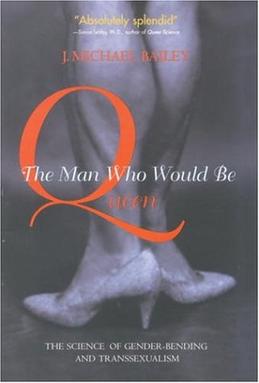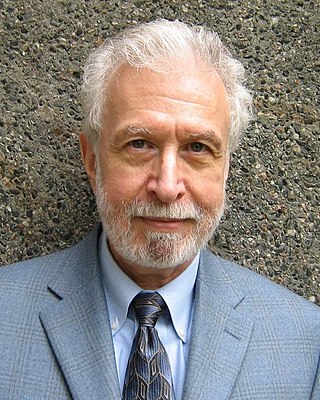The word cisgender describes a person whose gender identity corresponds to their sex assigned at birth, i.e., someone who is not transgender. The prefix cis- is Latin and means on this side of. The term cisgender was coined in 1994 as an antonym to transgender, and entered into dictionaries starting in 2015 as a result of changes in social discourse about gender. The term has been and continues to be controversial and subject to critique.

Darkness in El Dorado: How Scientists and Journalists Devastated the Amazon is a book written by author Patrick Tierney in 2000, in which the author accuses geneticist James Neel and anthropologist Napoleon Chagnon of conducting human research without regard for their subjects' well-being while conducting long-term ethnographic field work among the indigenous Yanomamo, in the Amazon basin between Venezuela and Brazil. He also wrote that the researchers had exacerbated a measles epidemic among the Native Americans, and that Jacques Lizot and Kenneth Good committed acts of sexual impropriety with Yanomamo.

Lynn Ann Conway was an American computer scientist, electrical engineer, and transgender activist.

John Michael Bailey is an American psychologist, behavioral geneticist, and professor at Northwestern University best known for his work on the etiology of sexual orientation and paraphilia. He maintains that male sexual orientation is most likely established in utero.
Patrick Tierney is an American writer based in Pittsburgh, Pennsylvania, who is the author of three books based on frequent visits to and field research in South America. As a mountain climber, he has worked with Johan Reinhard. He has made discoveries of Inca ceremonial mountaintop sites and, with Reinhard, made the second modern ascent of Mt. Del Veladero (21,115 ft) in Argentina in 1988. An Inca ceremonial platform and sacrificial site was discovered on top. Tierney has climbed all of the highest peaks in the Andes.

The Man Who Would Be Queen: The Science of Gender-Bending and Transsexualism is a 2003 book by the American psychologist J. Michael Bailey, published by Joseph Henry Press.

Ray Milton Blanchard III is an American-Canadian sexologist who researches pedophilia, sexual orientation and gender identity. He has found that men with more older brothers are more likely to be gay than men with fewer older brothers, a phenomenon he attributes to the reaction of the mother's immune system to male fetuses. Blanchard has also published research studies on phallometry and several paraphilias, including autoerotic asphyxia. Blanchard also proposed a typology of transsexualism.
The American-Canadian sexologist Ray Blanchard proposed a psychological typology of gender dysphoria, transsexualism, and fetishistic transvestism in a series of academic papers through the 1980s and 1990s. Building on the work of earlier researchers, including his colleague Kurt Freund, Blanchard categorized trans women into two groups: homosexual transsexuals who are attracted exclusively to men and are feminine in both behavior and appearance; and autogynephilic transsexuals who experience sexual arousal at the idea of having a female body. Blanchard and his supporters argue that the typology explains differences between the two groups in childhood gender nonconformity, sexual orientation, history of sexual fetishism, and age of transition.
Raymond D. Fowler was an American psychologist and Professor Emeritus of the University of Alabama. He was president of the American Psychological Association (1988) and served as APA's executive vice president and chief executive officer (CEO) from 1989 to 2003.

Andrea Jean James is an American transgender rights activist, film producer, and blogger.

Intersex people are individuals born with any of several sex characteristics, including chromosome patterns, gonads, or genitals that, according to the Office of the United Nations High Commissioner for Human Rights, "do not fit typical binary notions of male or female bodies".
Anne Alexandra Lawrence is an American psychologist, sexologist, and physician who has published extensively on gender dysphoria, transgender people, and paraphilias. Lawrence is a transgender woman and self-identifies as autogynephilic. She is best known for her 2013 book on autogynephilia, Men Trapped in Men's Bodies: Narratives of Autogynephilic Transsexualism, which has been regarded by Ray Blanchard as the definitive text on the subject. Lawrence is one of the major researchers in the area of Blanchard's etiological typology of transgender women and has been one of the most major proponents of the theory. While Blanchard's typology and autogynephilia are highly controversial subjects and are not accepted by many transgender women and academics, some, such as Lawrence, identify with autogynephilia. Lawrence's work also extends beyond Blanchard's typology, to transgender women and to transition more generally.

Alice Domurat Dreger is an American historian, bioethicist, author, and former professor of clinical medical humanities and bioethics at the Feinberg School of Medicine, Northwestern University, in Chicago, Illinois.

Intersex, in humans and other animals, describes variations in sex characteristics including chromosomes, gonads, sex hormones, or genitals that, according to the UN Office of the High Commissioner for Human Rights, "do not fit typical binary notions of male or female bodies".
Max Beck was an American intersex advocate, who was active in the now-defunct Intersex Society of North America (ISNA). On October 26, 1996 in Boston, Beck participated in the first known public demonstration against human rights violations on intersex people. The event is now annually commemorated and recognized as Intersex Awareness Day.

Intersex people are born with sex characteristics that "do not fit the typical definitions for male or female bodies". They are substantially more likely to identify as lesbian, gay, bisexual, or transgender (LGBT) than endosex people. According to a study done in Australia of Australian citizens with intersex conditions, participants labeled 'heterosexual' as the most popular single label with the rest being scattered among various other labels. According to another study, an estimated 8.5% to 20% experiencing gender dysphoria. Although many intersex people are heterosexual and cisgender, and not all of them identify as LGBTQ+, this overlap and "shared experiences of harm arising from dominant societal sex and gender norms" has led to intersex people often being included under the LGBT umbrella, with the acronym sometimes expanded to LGBTI. Some intersex activists and organisations have criticised this inclusion as distracting from intersex-specific issues such as involuntary medical interventions.

Intersex people in the United States have some of the same rights as other people, but with significant gaps, particularly in protection from non-consensual cosmetic medical interventions and violence, and protection from discrimination. Actions by intersex civil society organizations aim to eliminate harmful practices, promote social acceptance, and equality. In recent years, intersex activists have also secured some forms of legal recognition. Since April 11, 2022 US Passports give the sex/gender options of male, female and X by self determination.
The Lambda Literary Award for Transgender Literature is an annual literary award, presented by the Lambda Literary Foundation, that awards books with transgender content. Awards are granted based on literary merit and transgender content, and therefore, the writer may be cisgender. The award can be separated into three categories: transgender fiction, transgender nonfiction, and transgender poetry, though early iterations of the award included categories for bisexual/transgender literature, transgender/genderqueer literature, and transgender literature.

Men Trapped in Men's Bodies: Narratives of Autogynephilic Transsexualism is a 2013 book on the subject of autogynephilia and transgender women written by sexologist Anne Lawrence. In the book, she discusses autogynephilia, a paraphilia in which a person is sexually attracted to and aroused by the thought or image of themselves as female. It is defined as an erotic target location error, as a self-directed form of gynephilia, and as a sexuoromantic orientation. Autogynephilia has been theorized by some academics, such as Lawrence, Ray Blanchard, and J. Michael Bailey, to be the motivating etiology for a subset of transgender women. It has also been theorized to be the cause of the feelings and behaviors of certain non-transgender males, including non-transitioning autogynephiles and erotic crossdressers ("transvestites"). In respect to the latter, transvestism has been defined as a subtype of autogynephilia. Lawrence herself is a transgender woman and self-identifies as autogynephilic. However, Blanchard's etiological typology of transgender women and autogynephilia are highly controversial subjects and are not accepted by many other transgender women and academics. The book was published in 2013 by Springer in New York.










